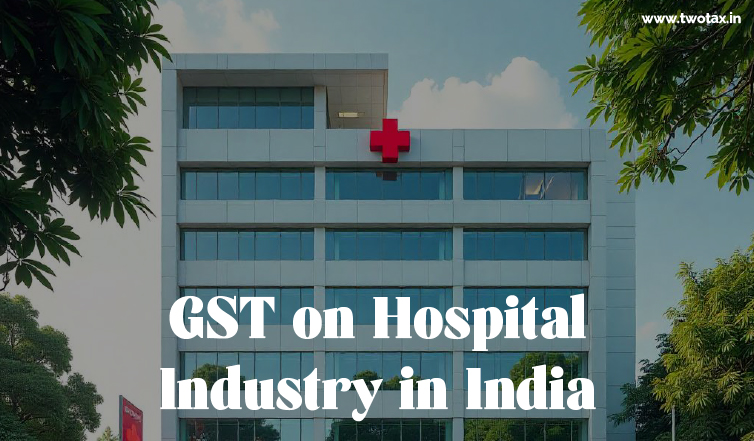Connect with us for all your queries



A mother rushes into the emergency ward of a private hospital in Delhi, clutching her feverish child. The doctors quickly diagnose a severe infection, requiring immediate admission and intensive care. As she anxiously waits for her child to stabilize, a different kind of shock awaits her—a hefty hospital bill, inflated by taxes she barely understands. The Goods and Services Tax (GST), introduced in 2017, has had a profound impact on India's hospital industry, affecting both service providers and patients. While healthcare is often viewed as a fundamental right rather than a business sector, the taxation policies surrounding it present a complex and sometimes controversial picture.
The healthcare industry in India has traditionally been considered a service sector that should remain largely tax-free to ensure affordability. However, GST has created a layered taxation system that affects hospitals, medical practitioners, pharmaceutical companies, and even patients in multiple ways.
The GST Council has largely exempted core healthcare services from taxation. This means that services such as hospital room charges, doctor consultations, diagnostic tests, and treatment procedures do not attract GST. However, there are exceptions:
Room rent exceeding ₹5000 per day (excluding ICU rooms) attracts an 18% GST.
Cosmetic surgeries that are not medically necessary fall under the taxable bracket.
Wellness and alternative treatments, such as Ayurveda and homeopathy, may be taxed depending on their classification.
Ambulance services, which are an essential part of emergency healthcare, are currently exempt from GST.
While hospital services may be exempt, essential inputs to the industry, such as medical devices and pharmaceuticals, do not enjoy complete exemption. GST rates are applied as follows:
Life-saving drugs: 5%
General medicines: 12%
Medical devices such as stents, implants, and prosthetics: 5%-12%
Hospital furniture and surgical equipment: 18%
COVID-related essentials such as oxygen concentrators, ventilators, and test kits: 5%
These taxes increase operational costs for hospitals, which, in turn, are indirectly passed on to patients.
Hospitals face unique taxation burdens due to the inverted duty structure. Since they provide tax-free services but pay taxes on essential inputs (medicines, equipment, and consumables), they are unable to claim input tax credit (ITC). This results in higher operational costs, which must be recovered either through increased charges or reduced profitability.
Further, small and medium-sized hospitals, especially those in rural areas, find it difficult to manage compliance with complex GST regulations. Many struggle to pass on the additional tax burden to patients, making operations financially unsustainable.
Additionally, hospitals often procure outsourced services such as housekeeping, catering, and security, all of which attract GST at rates varying from 5% to 18%. Since hospitals cannot claim ITC, these additional costs further burden the institution and, ultimately, the patients.
For the common citizen, the impact of GST on healthcare is not always visible, but it is deeply felt. Higher costs of medical treatment, diagnostic tests, and hospital stays mean that quality healthcare becomes less affordable, especially for low-income groups. While government hospitals and schemes like Ayushman Bharat provide relief to the underprivileged, the majority of India's middle-class population still relies on private healthcare, making them vulnerable to indirect tax burdens.
Medical insurance also plays a role in affordability. While healthcare services are exempt from GST, health insurance premiums attract an 18% GST, making policies more expensive. This discourages many middle-class families from opting for health insurance, further increasing out-of-pocket expenses when medical emergencies arise.
Given the sensitivity of the healthcare sector, policymakers must consider reforms to ease the tax burden while ensuring compliance. Some possible recommendations include:
Zero-rating hospitals: Allowing hospitals to claim ITC on their input costs without taxing their services would significantly reduce financial stress.
Reducing GST on essential medical supplies: Lowering tax rates on crucial equipment and medicines could reduce costs for both hospitals and patients.
Rationalizing GST on hospital room rent: The 18% tax on higher-end room charges could be reconsidered to ensure fairness.
Lowering GST on health insurance premiums: Encouraging health insurance by reducing the tax burden could improve accessibility to quality healthcare.
Simplifying compliance for small hospitals: Creating a less cumbersome GST structure for smaller healthcare providers could prevent financial distress and ensure continued operation in underserved areas.
The GST framework on the hospital industry in India is a double-edged sword. While core services remain tax-exempt, the burden of indirect taxation on inputs significantly impacts the affordability and accessibility of healthcare. Policymakers must take a balanced approach, ensuring that taxation does not become an impediment to healthcare delivery. As India moves towards a more robust and inclusive healthcare system, reforms in GST policies could play a crucial role in making quality medical care more affordable for all citizens.
A re-evaluation of GST policies in healthcare is crucial, particularly in a post-pandemic world where the importance of accessible, affordable, and high-quality medical services has never been more evident.
Tax Partner is India’s most reliable online business service platform, dedicated to helping you in starting, growing, & flourishing your business with our wide array of expert services at a very affordable cost.